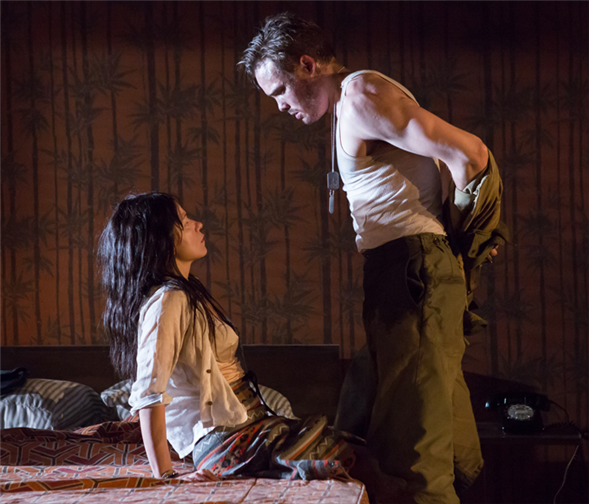Translate Page

A new play remembers "comfort women"
---
When American students are taught about World War II, the curriculum almost always includes the Holocaust, Germany, Pearl Harbor, and Hiroshima. But the war was more than those events. That's why Hansol Jung was determined her play Among the Dead would pay tribute to a much-overlooked community: Korean comfort women. That's the euphemistic name given to women who were forced into prostitution by the Japanese army.
"No one here knows about comfort women at all," Jung says. "I was trying to educate the people that would get to see the play. It was a mission. Everyone should know that this happened."
Among the Dead is currently receiving its world premiere, produced by Ma-Yi Theater Company, and playing at HERE Arts Center. Mostly set in 1975, it follows a young American woman named Ana who travels to Seoul to retrieve her father's ashes. She is the daughter of a Korean comfort woman and a white American soldier, and while she's abroad, she learns more about the father who raised her and the mother she never met.
In talking about the play and its subject matter, Jung is self-conscious. "I feel really weird writing about the stories that I found in my research, stories that belonged to other people," she says. That is partly why Among the Dead begins in 1975, long after the "comfort women stations" were closed, and then jumps around in time. This fluctuating narrative allows us to see what happened from multiple points of view, and it frees Jung from trying to write a "definitive" show about being a sex slave in the 1940s.
"I couldn't have written a story [that was only] about the situation, because it felt too raw and not my story," she says. "I was like, 'Ok, let's not play with the real thing, let's play at playing at it.'"
{Image1}
The inspiration for Among the Dead first came in 2009, when Jung was 27 and had already lived on three continents. She was born in South Korea, lived in South Africa from ages 6 to 13, and had recently begun studying directing at Pennsylvania State University. That summer, while she was in Korea on vacation, there were protests by Korean women in front of the Japanese embassy. They were demanding reparations from the Japanese government for forcing so many women into slavery. (Japan occupied Korea from 1910 to 1945.)
Though Jung did not know any comfort women at the time, she felt a kinship to them. Those women had been uprooted from their homes and forced to follow Japanese soldiers to China and southeast Asia. "That was definitely something that was on my mind as an issue, from my heart and my body, just the experience of displacement, of having uprooted oneself," she explains. "Obviously me and the comfort women were nowhere near each other in terms of experience. But I think there was a thing of alienation, of traveling abroad, a feeling of displacement, of not knowing how to land back [in your home]."
Yet even though the play begins in 1975, that doesn't mean it removes itself from the pain the comfort women experienced. For instance, Ana's mother's name is simply Number Four. She speaks of being raped 30 to 40 times a day and of feeling lost after the war: "I am not the name they continue to call me," she says. "I want to say, 'Please call me my new name. It is Number Four.'"
Meanwhile, the echoes of these war crimes are ongoing. It wasn't until 2015 that the Japanese government agreed to pay reparations to Korea, meaning survivors spent decades waiting for their nightmare to be acknowledged. While writing the play, Jung spoke to some of these comfort women. She calls them "grannies," and she regrets only meeting a handful. In hearing their stories, she says, "It just made me really, really angry. And sad. And grateful to be standing basically on their sacrifice. I wanted to honor them and tell their stories."
---
Follow Diep Tran at @DiepThought. Follow TDF at @TDFNYC.
Photos by Hunter Canning. Top photo: Julienne Hanzelka Kim and Mickey Theis.
TDF Members:Go here to browse our current discounts for theatre, dance, and concerts.